Lasswell Harold D. The Political Writings of Harold D. Lasswell
Подождите немного. Документ загружается.

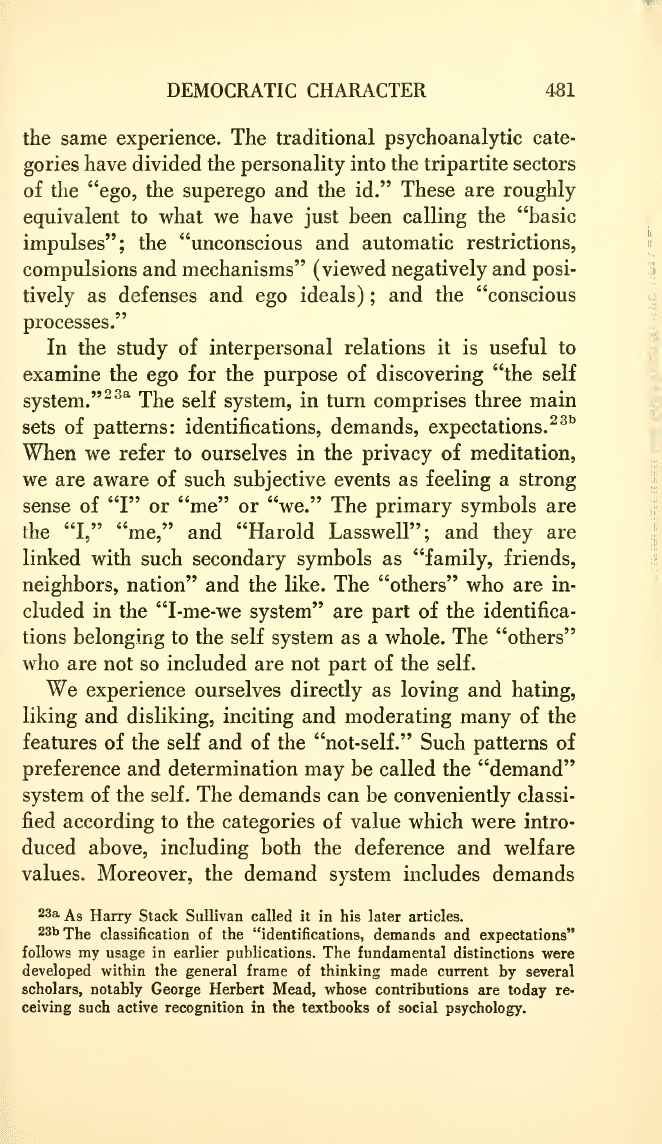
DEMOCRATIC
CHARACTER 481
the same
experience.
The
traditional psychoanalytic cate-
gories have
divided the personality into
the tripartite sectors
of the
"ego,
the superego and the id."
These are roughly
equivalent to what we have just been
calling the
"basic
impulses";
the "unconscious and
automatic restrictions,
compulsions and mechanisms" (viewed
negatively and
posi-
tively as
defenses and ego ideals) ;
and the "conscious
processes."
In the
study of
interpersonal
relations it is useful to
examine the
ego
for the purpose of
discovering "the
self
system."
^^^
The self system, in
turn comprises three
main
sets of
patterns: identifications, demands, expectations.^^''
When we
refer to ourselves in the
privacy
of
meditation,
we
are
aware
of such
subjective events as feeling a strong
sense of "I" or "me"
or
"we."
The primary symbols are
the "I,"
"me," and
"Harold Lasswell"; and they are
linked
with such secondary symbols as
"family, friends,
neighbors,
nation" and the like. The "others" who are
in-
cluded in the "I-me-we system" are part
of
the identifica-
tions
belonging to the self system
as a
whole. The "others"
who
are not
so
included are not part
of
the self.
We
experience ourselves directly as loving and hating,
liking
and disliking, inciting
and
moderating
many of
the
features
of the self and
of the
"not-self." Such patterns of
preference and determination may
be called
the
"demand"
system
of the self. The demands
can be conveniently classi-
fied according to the categories
of value which were intro-
duced above, including both the
deference and welfare
values.
Moreover, the demand
system includes demands
23a
As Harry Stack Sullivan called
it
in
his
later
articles.
23b
Tiie
classification of the "identifications,
demands
and expectations"
follows
my usage in earlier publications. The
fundamental
distinctions
were
developed within
the general frame of
thinking
made current
by several
scholars, notably
George Herbert Mead, whose contributions
are today re-
ceiving such active recognition
in the textbooks of social
psychology.
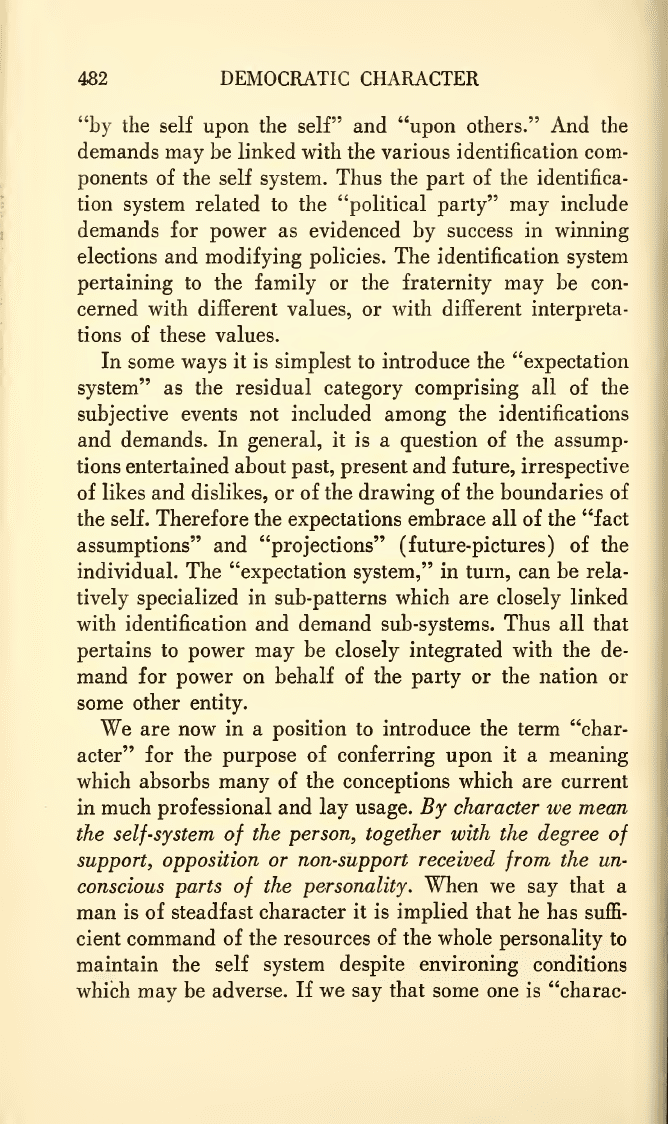
482
DEMOCRATIC CHARACTER
"by the
self upon the self" and "upon others." And the
demands may
be
linked
with the
various identification com-
ponents
of
the self system. Thus the part of the identifica-
tion
system related to the "political
party"
may
include
demands for
power as evidenced by success in
winning
elections and modifying
policies.
The identification system
pertaining to the family or the fraternity may
be
con-
cerned with different values,
or
with
different interpreta-
tions of these values.
In some ways it is simplest to introduce the
"expectation
system" as
the
residual category
comprising all
of the
subjective events
not
included
among
the identifications
and demands.
In general,
it
is
a question of
the assump-
tions
entertained
about
past, present
and
future, irrespective
of likes
and dislikes,
or of the
drawing of the boundaries of
the self.
Therefore
the
expectations embrace
all of the
"fact
assumptions"
and "projections" (future-pictures)
of
the
individual.
The
"expectation system," in turn, can be rela-
tively specialized in sub-patterns which are closely linked
with identification and demand sub-systems. Thus all that
pertains to
power
may be closely integrated with the de-
mand
for power on behalf of the party or the nation or
some
other entity.
We are now in a
position
to
introduce
the
term "char-
acter" for the
purpose of conferring
upon
it
a meaning
which
absorbs many of the conceptions which are current
in much
professional and lay
usage.
By character we mean
the
self-system
of
the person, together with the
degree
of
support, opposition or
non-support received
from
the un-
conscious
parts
of
the personality.
When
we say that
a
man is
of steadfast
character it is implied that he
has suffi-
cient command of
the resources of the whole
personality
to
maintain the
self system despite
environing
conditions
which may be
adverse.
If we say that some one
is "charac-
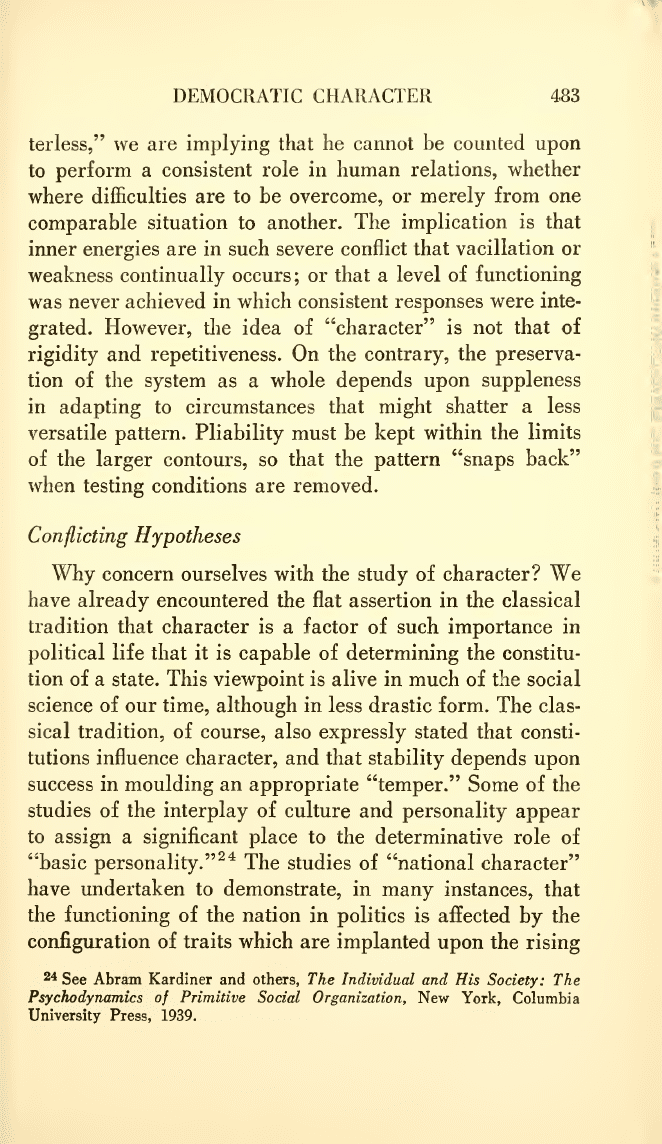
DEMOCRATIC CHARACTER
483
terless," we
are
implying
that
he cannot be counted upon
to
perform a
consistent role in
human relations, whether
where
difficulties are to
be
overcome,
or merely from one
comparable
situation
to
another. The
implication
is
that
inner energies
are
in such
severe conflict
that vacillation or
weakness
continually occurs;
or
that
a
level of
functioning
was never achieved in
which consistent
responses were inte-
grated.
However,
the idea of
"character" is
not that of
rigidity and repetitiveness. On the
contrary, the
preserva-
tion
of
the system
as a
whole depends
upon
suppleness
in adapting
to
circumstances that
might shatter a less
versatile pattern. Pliability must be kept
within the
limits
of the larger contours,
so
that
the
pattern
"snaps
back"
when
testing conditions
are removed.
Conflicting
Hypotheses
Why
concern ourselves with
the study of
character?
We
have
already encountered
the
flat assertion in
the
classical
tradition
that character
is a
factor
of such
importance
in
political
life that it is capable
of
determining the constitu-
tion
of a state. This viewpoint is alive in much
of
the social
science
of our time, although in less drastic form.
The clas-
sical tradition,
of course, also expressly stated
that consti-
tutions
influence
character,
and that stability
depends upon
success
in
moulding
an
appropriate
"temper."
Some of the
studies
of
the interplay
of culture and personality
appear
to assign
a
significant place to
the determinative
role
of
"basic
personality."^* The studies
of "national character"
have undertaken to
demonstrate,
in many instances,
that
the functioning
of the nation
in
politics
is affected
by the
configuration
of traits which are implanted
upon the rising
24
See
Abram Kardiner and others,
The Individual
and His Society: The
Psychodynamics
of
Primitive
Social Organization,
New
York,
Columbia
University
Press, 1939.
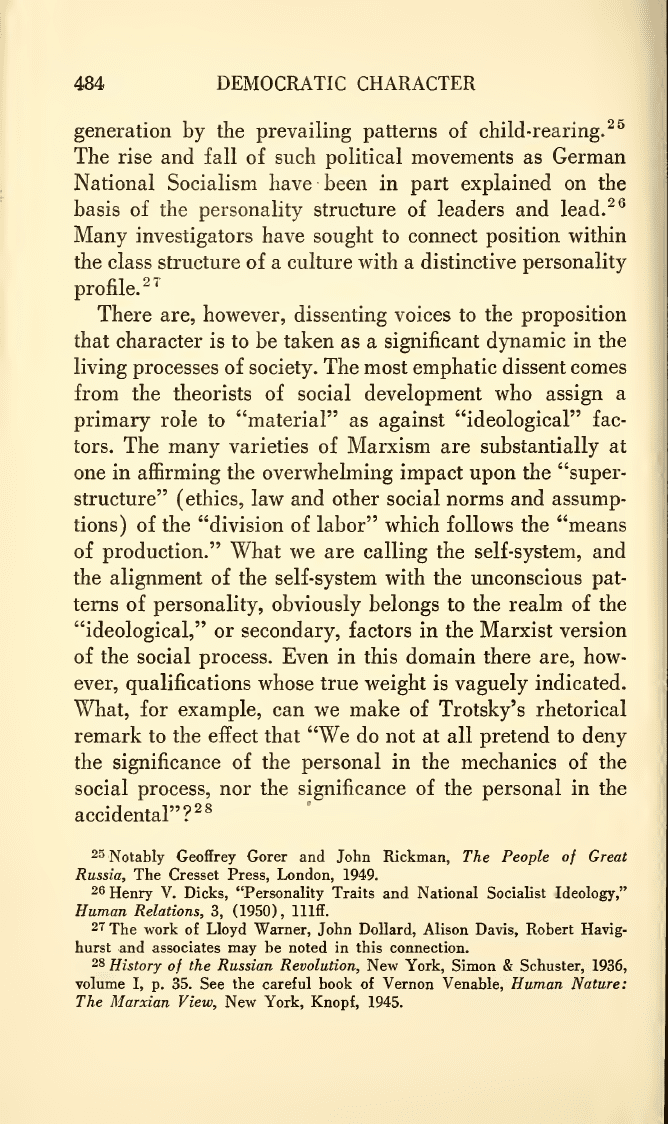
484 DEMOCRATIC CHARACTER
generation
by the prevailing
patterns
of
child-rearing.^^
The rise
and fall of such
political movements
as
German
National Socialism
have been in
part explained on the
basis of the personality structure
of
leaders and lead.^^
Many investigators
have sought to
connect position within
the class structure
of a
culture with
a
distinctive
personality
profile.
^^
There
are, however, dissenting voices to
the proposition
that
character is to
be
taken
as a
significant
dynamic in the
living
processes of society. The most emphatic
dissent comes
from the theorists of social development who
assign a
primary role
to
"material"
as
against "ideological"
fac-
tors. The many varieties
of
Marxism are substantially
at
one in affirming the overwhelming impact upon the
"super-
structure" (ethics,
law
and other social norms and assump-
tions)
of the
"division
of labor" which
follows
the
"means
of
production."
What we are
calling
the
self-system, and
the alignment of the self-system with the unconscious
pat-
terns
of
personality, obviously belongs
to
the realm of the
"ideological," or
secondary, factors in the
Marxist version
of
the
social
process.
Even in this domain there are,
how-
ever,
qualifications whose true weight
is
vaguely
indicated.
What, for
example,
can we make of Trotsky's rhetorical
remark to the
effect
that "We do not at all pretend to deny
the significance of the personal in the mechanics of
the
social process, nor the
significance
of the personal in the
accidental"?2«
25
Notably Geoffrey Gorer and
John Rickman, The
People
of
Great
Russia, The Cresset Press, London, 1949.
26
Henry V. Dicks, "Personality Traits
and National Socialist Ideology,"
Human
Relations,
3,
(1950),
lllff.
2''^
The work
of
Lloyd Warner,
John Dollard, Alison Davis,
Robert Havig-
hurst and associates may be noted in this connection.
28
History
of
the Russian
Revolution,
New York, Simon
&
Schuster,
1936,
volume
I,
p.
35. See
the careful
book of
Vernon
Venable, Human
Nature:
The Marxian View,
New York,
Knopf, 1945.
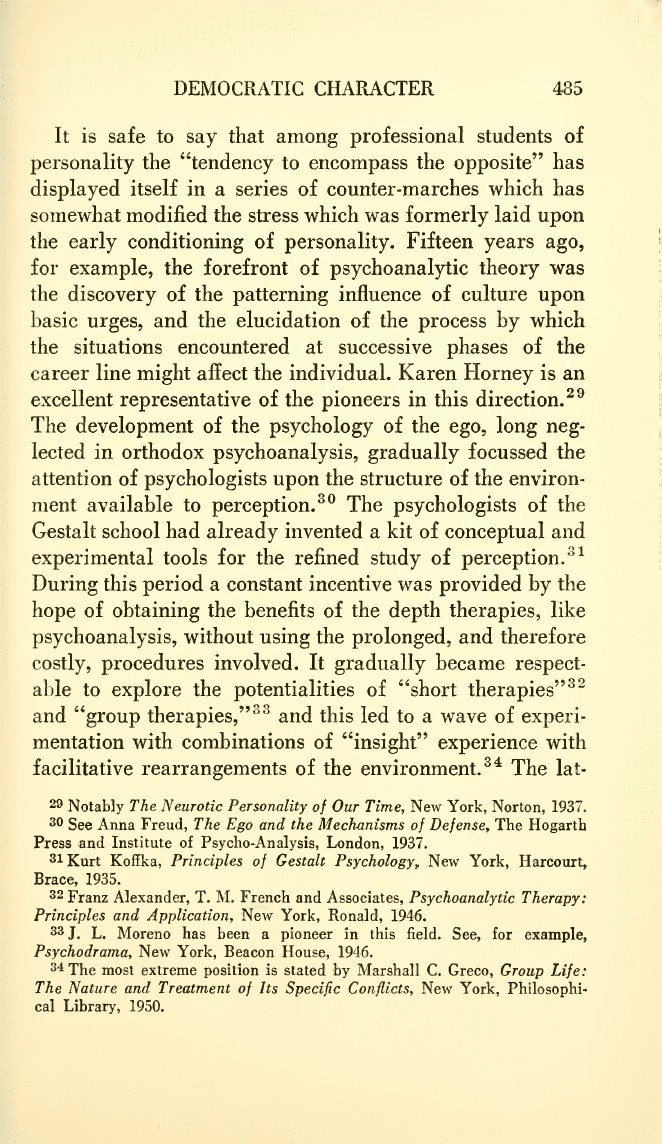
DEMOCRATIC CHARACTER 485
It is
safe to say that
among professional students of
personality
the
"tendency
to
encompass the opposite" has
displayed itself in
a
series
of
counter-marches
which
has
somewhat modified the stress which was
formerly laid
upon
the early conditioning
of
personality. Fifteen
years
ago,
for
example, the forefront of
psychoanalytic theory was
the
discovery of the patterning influence of
culture upon
basic
urges, and the elucidation of the process by
which
the situations encountered at successive phases of the
career line might affect the individual. Karen
Horney
is an
excellent representative of the pioneers in this direction.
^^
The development
of
the psychology
of
the
ego,
long neg-
lected
in orthodox
psychoanalysis,
gradually focussed the
attention
of psychologists upon the structure of the environ-
ment available to perception.
^^
The psychologists of the
Gestalt school had already invented
a
kit
of
conceptual and
experimental
tools
for
the
refined
study of
perception.
^^
During
this
period
a constant incentive was provided by the
hope of obtaining the benefits
of
the depth therapies, like
psychoanalysis, without using the prolonged, and therefore
costly, procedures involved. It gradually
became
respect-
able
to
explore
the
potentialities
of
"short
therapies"
^^
and "group therapies,"
^'^
and this
led to a wave of experi-
mentation
with
combinations
of "insight" experience with
facilitative
rearrangements
of the environment.^*
The
lat-
29
Notably
The Neurotic Personality
of
Our Time, New York, Norton, 1937.
30
See
Anna Freud, The Ego
and
the
Mechanisms
of
Defense, The Hogarth
Press
and
Institute of
Psycho-Analysis,
London,
1937.
31
Kurt KofFka, Principles
of
Gestalt
Psychology,
New York, Harcourt,
Brace, 1935.
32
Franz
Alexander,
T.
M. French
and Associates, Psychoanalytic
Therapy:
Principles and
Application,
New York,
Ronald, 1946.
33
J.
L. Moreno has been
a
pioneer in this field.
See,
for
example,
Psychodrama,
New York, Beacon
House,
1946.
34
The most extreme position is
stated
by Marshall C. Greco, Group
Life:
The Nature and Treatment
of
Its
Specific Conflicts,
New
York,
Philosophi-
cal Library, 1950.
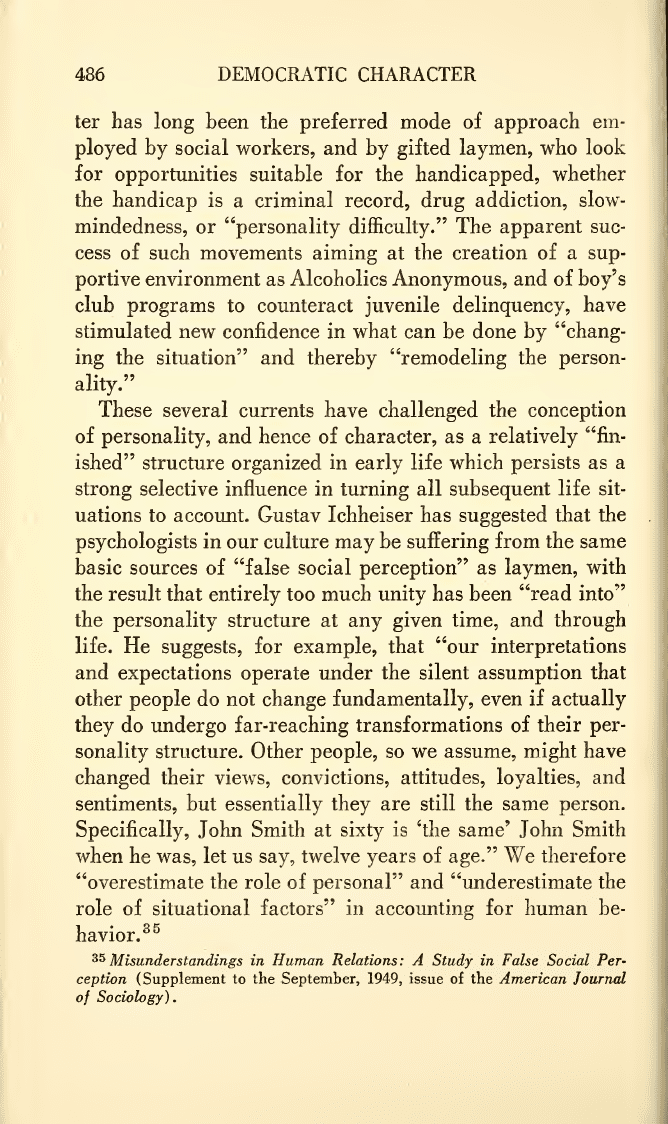
486 DEMOCRATIC CHARACTER
ter has long
been the preferred mode of
approach
em-
ployed by social workers,
and by
gifted laymen, who
look
for
opportmiities suitable
for
the handicapped,
whether
the handicap
is
a
criminal record, drug
addiction,
slow-
mindedness,
or "personality difficulty." The
apparent suc-
cess of such movements aiming
at
the creation of a sup-
portive environment
as
Alcoholics Anonymous, and of boy's
club programs
to
counteract juvenile delinquency,
have
stimulated new confidence
in
what can
be
done by
"chang-
ing
the situation" and thereby "remodeling the
person-
ality."
These several currents
have
challenged the
conception
of
personality, and hence of character, as
a
relatively "fin-
ished"
structure organized
in early
life
which
persists
as a
strong
selective influence in turning all
subsequent life
sit-
uations
to account. Gustav Ichheiser has
suggested that
the
psychologists
in our culture may be
suffering from the same
basic sources
of "false social
perception"
as
laymen,
with
the
result that entirely too much
unity
has
been "read into"
the personality structure
at
any given time, and
through
life. He suggests, for example, that "our
interpretations
and expectations
operate
under the silent assumption
that
other people
do
not change fundamentally, even if actually
they
do
undergo far-reaching transformations of
their
per-
sonality
structure. Other people, so we
assume,
might
have
changed
their views,
convictions, attitudes, loyalties,
and
sentiments,
but
essentially they are still the same person.
Specifically,
John
Smith at
sixty is 'the same'
John
Smith
when
he
was, let us say,
twelve years of age." We therefore
"overestimate the role of personal" and "underestimate
the
role of
situational factors"
in accounting for
human be-
havior.
^^
^^Misunderstandings in Human
Relations:
A Study
in
False Social
Per-
ception (Supplement to the September,
1949,
issue of the American Journal
of
Sociology).
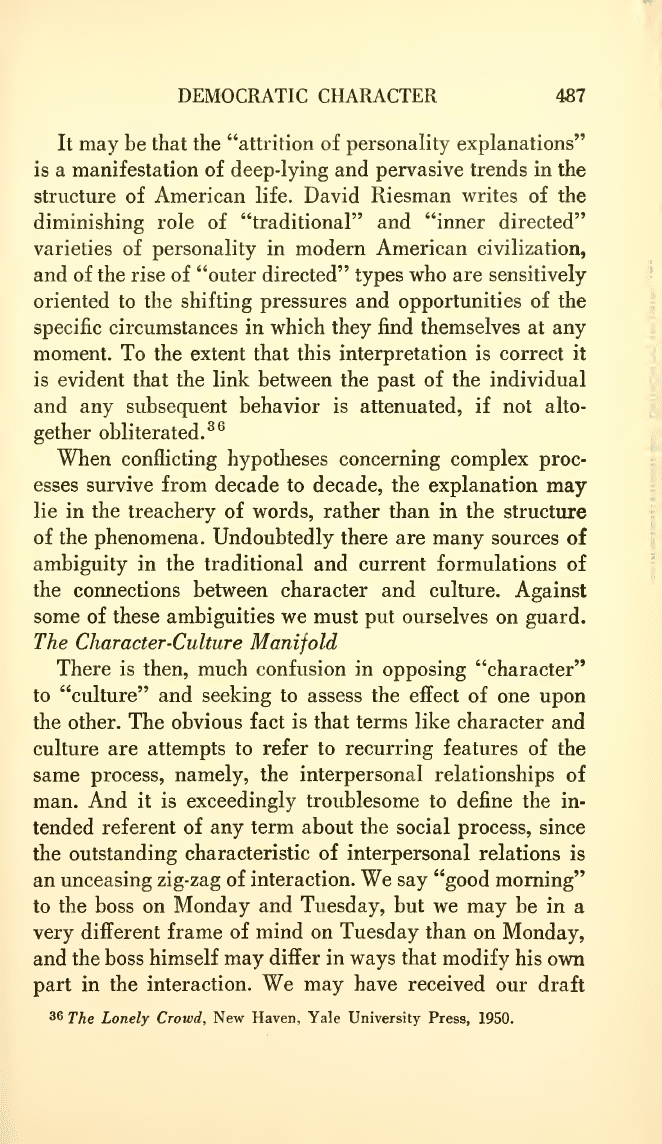
DEMOCRATIC CHARACTER
487
It
may
be
that the
"attrition of personality explanations"
is a manifestation of
deep-lying and pervasive trends in the
structure of
American
life. David
Riesman
writes
of the
diminishing
role of
"traditional" and
"inner
directed"
varieties
of
personality
in modern
American
civilization,
and of the rise of
"outer
directed" types
who are sensitively
oriented
to the
shifting pressures and opportunities of
the
specific circumstances
in
which they find themselves at any
moment. To the
extent
that
this interpretation
is
correct it
is evident that the
link
between the past of the
individual
and
any
subsequent
behavior is attenuated, if not alto-
gether
obliterated.^^
When
conflicting
hypotheses concerning complex proc-
esses survive from
decade to decade, the explanation
may
lie
in
the treachery
of words, rather than in the structure
of the
phenomena.
Undoubtedly there are many
sources of
ambiguity
in the traditional and current formulations
of
the
connections between character and culture.
Against
some
of these ambiguities we must put ourselves
on
guard.
The
Character-Culture
Manifold
There
is then, much confusion in opposing
"character"
to "culture" and seeking to assess the effect
of one
upon
the other. The obvious
fact is
that terms like
character
and
culture are
attempts to refer
to recurring
features
of
the
same
process, namely, the
interpersonal
relationships
of
man.
And it is
exceedingly troublesome
to define the
in-
tended
referent of any
term
about
the
social process, since
the
outstanding
characteristic
of interpersonal
relations
is
an
unceasing
zig-zag
of
interaction.
We say "good morning"
to
the boss on
Monday and Tuesday, but we
may be
in a
very
different frame of
mind
on
Tuesday
than
on Monday,
and the boss
himself
may differ in ways that
modify
his
own
part
in
the
interaction. We may have
received
our draft
36
The Lonely
Crowd, New Haven,
Yale
University Press,
1950.
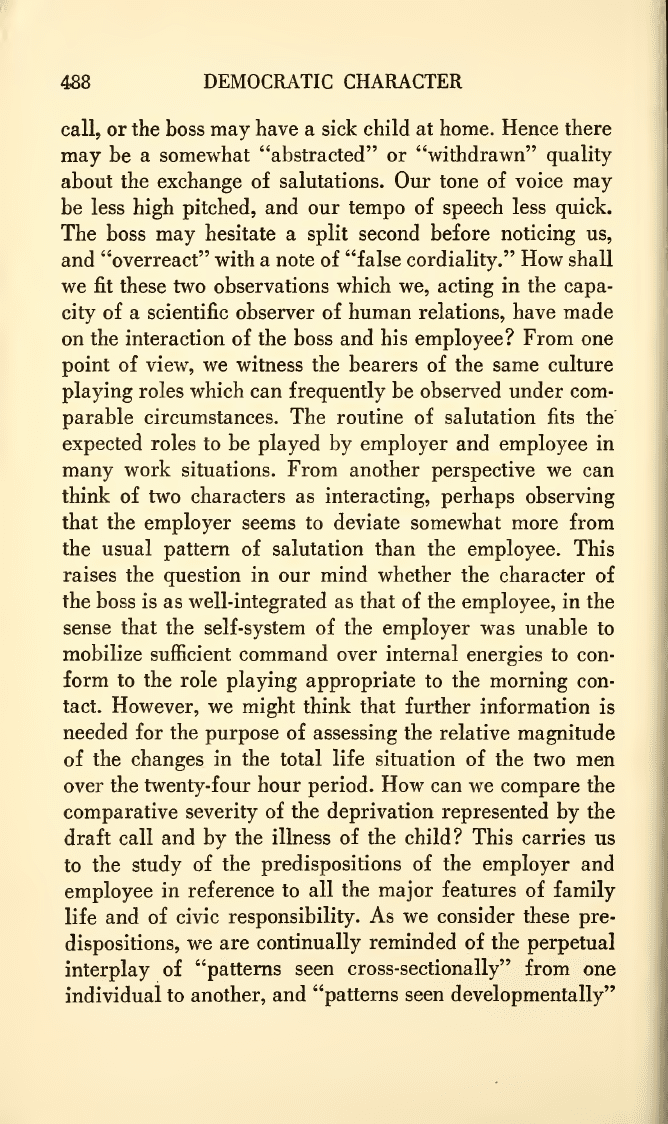
488
DEMOCRATIC CHARACTER
call, or the boss may
have
a
sick child at home.
Hence there
may
be
a
somewhat "abstracted"
or "withdrawn" quality
about the exchange of
salutations.
Our tone
of voice may
be less high pitched,
and our tempo of speech less
quick.
The boss may
hesitate
a
split second before
noticing
us,
and
"overreact" with a note of
"false cordiality." How shall
we
fit
these
two observations which we, acting in
the
capa-
city of
a
scientific observer of
human
relations,
have made
on the interaction of the boss and
his employee? From one
point of
view,
we witness the bearers of the
same culture
playing roles which
can
frequently
be
observed under
com-
parable
circumstances.
The
routine
of
salutation
fits the
expected roles
to be
played
by
employer
and employee in
many
work situations. From another
perspective we
can
think
of two characters as interacting, perhaps observing
that the employer seems
to
deviate somewhat more from
the usual pattern of salutation than the employee.
This
raises the question in our mind whether
the character
of
the boss
is as
well-integrated
as
that
of the employee, in the
sense that the self-system of the employer
was unable
to
mobilize sufficient command over
internal energies to
con-
form to the role playing appropriate
to the morning
con-
tact. However, we might think
that further information
is
needed
for the purpose
of
assessing
the relative magnitude
of the changes
in the total life situation
of the two men
over the
twenty-four hour period. How can
we compare the
comparative severity of the deprivation represented
by the
draft
call and by the
illness of the
child? This carries
us
to
the study
of
the
predispositions of the
employer and
employee
in
reference to
all the major features
of family
life and
of
civic
responsibility. As we consider these pre-
dispositions, we
are
continually reminded of the
perpetual
interplay of
"patterns
seen
cross-sectionally"
from
one
individual
to
another,
and
"patterns seen
developmentally"
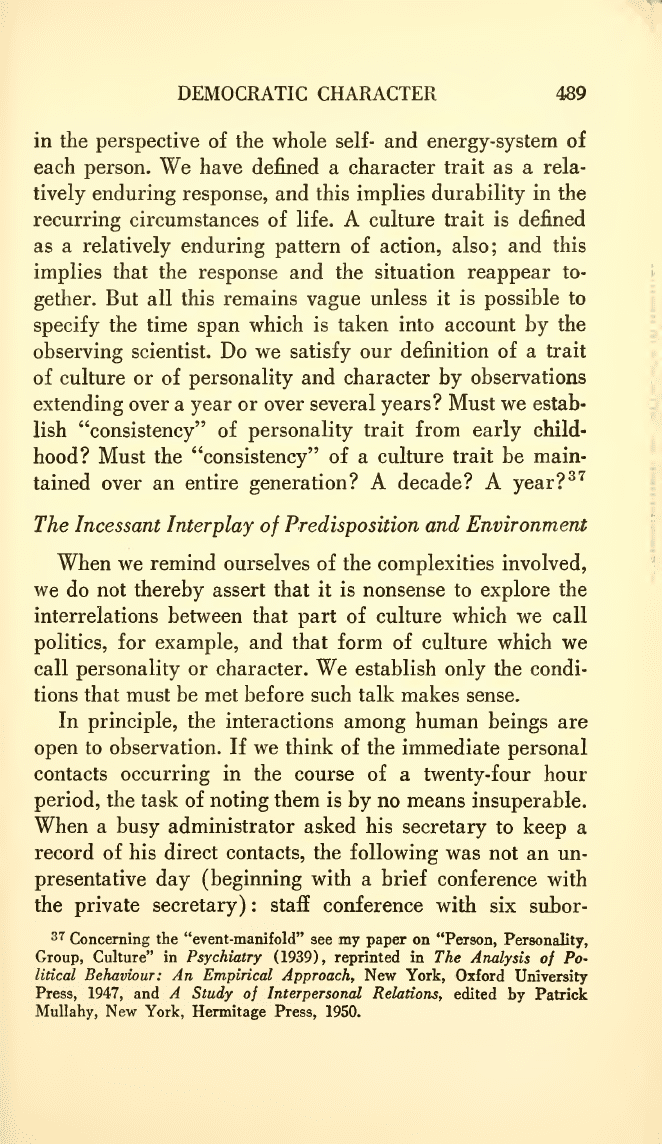
DEMOCRATIC CHARACTER
489
in
the perspective
of the whole self- and energy-system
of
each
person.
We have defined
a
character
trait
as a
rela-
tively enduring
response, and this implies
durability in the
recurring circumstances
of life. A culture
trait is defined
as a relatively enduring
pattern of
action, also; and
this
implies that the
response and the
situation reappear to-
gether. But all this remains vague
unless it is possible
to
specify the
time
span
which is
taken into account by the
observing
scientist.
Do we
satisfy our
definition of a
trait
of culture or of
personality and character
by
observations
extending over
a
year or over several
years?
Must we estab-
lish "consistency" of
personality trait
from early
child-
hood?
Must
the "consistency"
of
a
culture trait be main-
tained over an entire
generation? A decade? A
year?^'^
The Incessant Interplay
of
Predisposition and
Environment
When
we
remind ourselves
of the
complexities involved,
we
do not thereby assert that it is nonsense to
explore the
interrelations
between that part of culture which we call
politics, for
example,
and that form of culture which
we
call personality or character. We establish only
the
condi-
tions
that must be met before such talk makes sense.
In principle,
the
interactions
among human
beings are
open to
observation.
If
we think
of the immediate
personal
contacts occurring
in the course
of a twenty-four hour
period,
the task of noting them is
by no means insuperable.
When
a busy administrator asked his secretary
to keep
a
record of his direct
contacts,
the following
was not
an
un-
presentative day
(beginning with
a brief
conference
with
the private
secretary)
:
stafE
conference
with six
subor-
3'^
Concerning the "event-manifold"
see my paper
on "Person,
Personality,
Group, Culture"
in Psychiatry
(1939),
reprinted in
The
Analysis
of
Po-
litical
Behaviour: An Empirical Approach,
New York,
Oxford
University
Press,
1947,
and A Study
of
Interpersonal
Relations,
edited
by Patrick
MuUahy, New York, Hermitage Press,
1950.
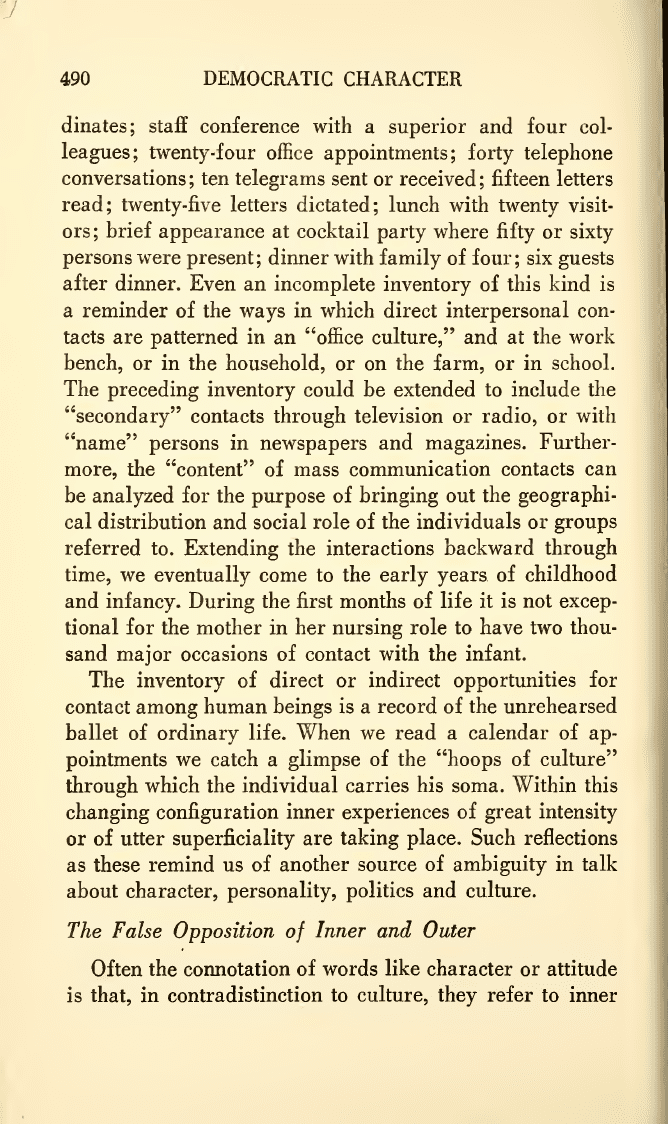
490 DEMOCRATIC
CHARACTER
dinates;
staff conference
with
a
superior
and four col-
leagues;
twenty-four
office appointments; forty
telephone
conversations
;
ten telegrams
sent
or received ; fifteen
letters
read; twenty-five letters
dictated; lunch with
twenty visit-
ors; brief appearance
at cocktail party
where fifty or sixty
persons were present;
dinner with
family of four; six guests
after dinner.
Even an incomplete
inventory
of
this kind is
a reminder
of
the
ways in
which direct interpersonal con-
tacts are
patterned in an "office culture," and at the
work
bench, or
in the household, or on the farm, or in
school.
The
preceding inventory could
be
extended to include
the
"secondary" contacts through television or radio, or with
"name" persons in newspapers and
magazines.
Further-
more, the "content"
of
mass
commimication contacts
can
be
analyzed
for the purpose
of bringing out
the
geographi-
cal distribution and social role of the
individuals or
groups
referred
to. Extending the interactions
backward through
time,
we eventually come to the
early years of
childhood
and infancy. During the first months of life it is
not excep-
tional for the mother
in
her nursing role to have two
thou-
sand major occasions of
contact with
the
infant.
The inventory of direct or
indirect
opportunities
for
contact among human beings
is
a
record of the unrehearsed
ballet of ordinary life. When we read a
calendar
of ap-
pointments
we
catch
a
glimpse of the
"hoops
of
culture"
through
which the individual
carries his
soma.
Within
this
changing
configuration inner experiences of
great intensity
or of
utter
superficiality are
taking place.
Such reflections
as these
remind us of
another
source
of
ambiguity
in
talk
about character,
personality, politics and culture.
The False
Opposition
of
Inner and Outer
Often
the connotation
of words like character
or attitude
is
that, in contradistinction
to culture, they refer
to inner
